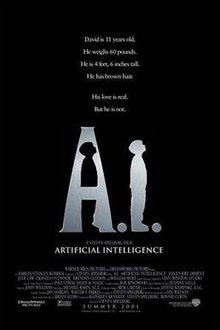| A.I. Artificial Intelligence | |
|---|---|
 Theatrical release poster | |
| Directed by | Steven Spielberg |
| Screenplay by | Steven Spielberg |
| Screen story by | Ian Watson |
| Based on | "Supertoys Last All Summer Long" by Brian Aldiss |
| Produced by |
|
| Starring | |
| Cinematography | Janusz Kamiński |
| Edited by | Michael Kahn |
| Music by | John Williams |
Production companies | |
| Distributed by | Warner Bros. Pictures[a] |
Release date |
|
Running time | 146 minutes[1] |
| Country | United States |
| Language | English |
| Budget | $90–100 million[2][3] |
| Box office | $235.9 million[3] |
A.I. Artificial Intelligence (or simply A.I.) is a 2001 American science fiction film directed by Steven Spielberg. The screenplay by Spielberg and screen story by Ian Watson are loosely based on the 1969 short story "Supertoys Last All Summer Long" by Brian Aldiss. Set in a futuristic society, the film stars Haley Joel Osment as David, a childlike android uniquely programmed with the ability to love. Jude Law, Frances O'Connor, Brendan Gleeson and William Hurt star in supporting roles.
Development of A.I. originally began after producer and director Stanley Kubrick acquired the rights to Aldiss's story in the early 1970s. Kubrick hired a series of writers, including Aldiss, Bob Shaw, Ian Watson and Sara Maitland, until the mid-1990s. The film languished in development hell for years, partly because Kubrick felt that computer-generated imagery was not advanced enough to create the David character, which he believed no child actor would convincingly portray. In 1995, Kubrick handed A.I. to Spielberg, but the film did not gain momentum until Kubrick died in 1999. Spielberg remained close to Watson's treatment for the screenplay and dedicated the film to Kubrick.
A.I. Artificial Intelligence was released on June 29, 2001, by Warner Bros. Pictures in North America. It received generally positive reviews from critics and grossed $235.9 million against a budget of $90–100 million. It was also nominated for Best Visual Effects and Best Original Score (for John Williams) at the 74th Academy Awards. In a 2016 BBC poll of 177 critics around the world, A.I. Artificial Intelligence was voted the eighty-third greatest film since 2000. It has since been called one of Spielberg's best works and one of the greatest films of the 21st century, and of all time.[4][5][6][7][8]
Cite error: There are <ref group=lower-alpha> tags or {{efn}} templates on this page, but the references will not show without a {{reflist|group=lower-alpha}} template or {{notelist}} template (see the help page).
- ^ "A.I. (12)". British Board of Film Classification. Archived from the original on April 8, 2014. Retrieved April 7, 2014.
- ^ "Artificial Intelligence: AI (2001) - Financial Information". The Numbers.
- ^ a b Cite error: The named reference
mojowas invoked but never defined (see the help page). - ^ "The 21st Century's 100 greatest films". BBC. August 23, 2016. Archived from the original on January 31, 2017. Retrieved July 31, 2017.
- ^ "The 100 best films of the 21st century (So far)". February 6, 2022.
- ^ "A.I. Is the Best Film of the 21st Century". National Review. June 30, 2021.
- ^ "The 150 Greatest Science Fiction Movies of All Time". Rolling Stone. January 2024.
- ^ "The 100 Best Movies of the 2000s". IndieWire. August 12, 2024.